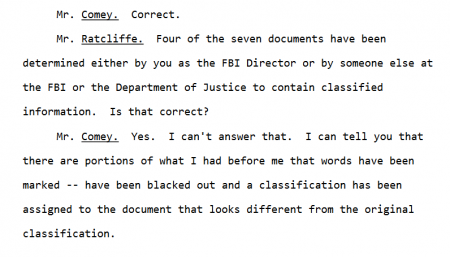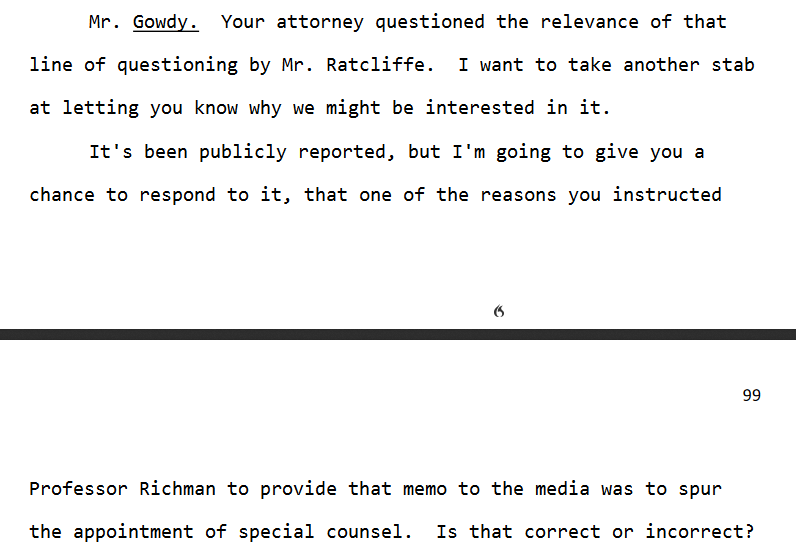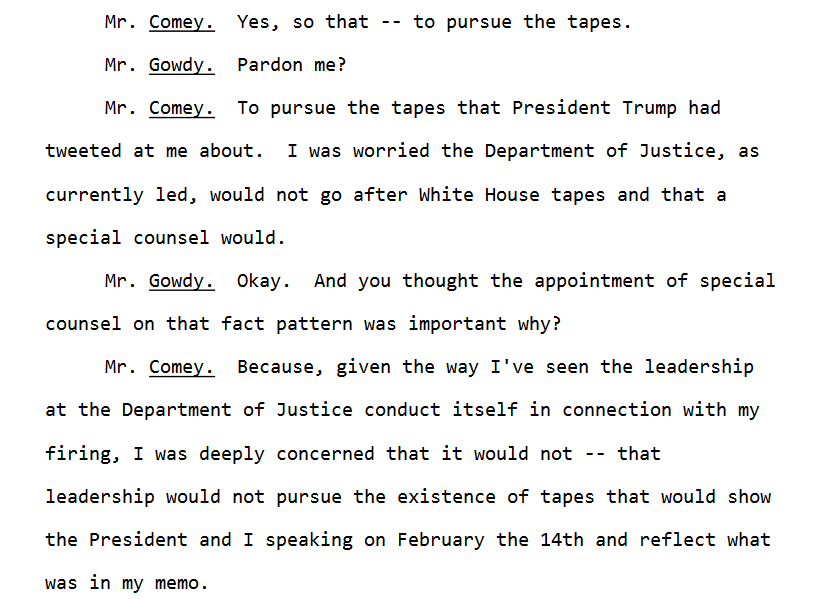WANTED SPECIAL COUNSEL APPOINTED “TO PURSUE THE TAPES”
by Sharon Rondeau
 (Dec. 19, 2018) — On page 83 of the transcript from former FBI director James Comey’s testimony to the U.S. House Judiciary and Oversight & Government Reform Committees on Monday, Rep. John Ratcliffe is noted to have asked Comey whether or not former Secretary of State Hillary Clinton sent “classified” information to then-White House occupant Barack Obama over her non–governmental email server.
(Dec. 19, 2018) — On page 83 of the transcript from former FBI director James Comey’s testimony to the U.S. House Judiciary and Oversight & Government Reform Committees on Monday, Rep. John Ratcliffe is noted to have asked Comey whether or not former Secretary of State Hillary Clinton sent “classified” information to then-White House occupant Barack Obama over her non–governmental email server.
Comey was accompanied to the question-and-answer session, which was not conducted under oath, by one of his attorneys, David Kelley, a former U.S. attorney for the Southern District of New York.
Ratcliffe, also a former U.S. attorney, represents Texas’s 4th Congressional District.
The question arose after Comey acknowledged that the FBI recovered at least one message between Clinton and then-White House occupant Barack Hussein Obama, the latter of whom was using a screen name at the time. Clinton reportedly sent the email from her non-secure server while she was visiting a “foreign adversary” nation.
At the bottom of the page, Ratcliffe’s questioning shifted from Clinton’s emails to seven memos Comey created memorializing his interactions with Donald Trump, one of which Comey released to Columbia Law School professor Daniel Richman to leak to the media.
In April, the Chicago Tribune reported that Richman is a member of Comey’s “legal team,” which Comey affirmed to Ratcliffe during questioning Monday (p. 91 of transcript).
The memos were dated between January 7, 2017 and April 11, 2017, the record established. On page 84, Ratcliffe is noted to have declared to, and then asked of, Comey, “Four of the seven documents have been determined either by you as the FBI Director or by someone else at the FBI or the Department of Justice to contain classified information. Is that correct?”
In response, Comey said, “Yes. I can’t answer that…”

After what appears to have been a break, Ratcliffe resumed questioning Comey about the classification level of the seven memos (p. 85). ” In response to Ratcliffe’s request for Comey to confirm that “four of the seven” memos were marked either “Secret” or “Confidential,” Comey responded by enumerating the designations of six of the memos, after which Ratcliffe asked, “And the classified portions would be reflected by those blacked-out redactions, correct?”
Comey replied with a combination of, “Yeah,” “I don’t know that,” and “Certainly, yes, at least in part.” “I don’t remember what these little notations in the margin mean,” he concluded his answer.
Ratcliffe’s continued questioning attempted to establish whether or not the “Comey memos” are “government records” and if Comey’s release of the February 14, 2017 memo to Richman was a breach of his FBI employment agreement. On page 88, Comey characterized the document he signed as “an FBI employment nondisclosure agreement.”
Comey told Ratcliffe that the memos he deemed “not classified” he gave to his Chief of Staff, James Rybicki, who has since resigned from the FBI. Comey said he then made copies of them to maintain “in my personal safe at home.”
Comey did not answer any questions which dealt directly with communications with his attorneys, with the exception of the February 14, 2017 memo. Of that, Comey said he sent Richman “images” with the purpose of “sharing it with a journalist” (p. 90).
Ratcliffe then said he wanted to know the extent to which Comey shared the memos with persons outside of the FBI, asking Comey if his attorneys have “security clearances” (p. 92).

Comey refused to answer as to whether or not he had sent “classified information” to Kelly, Richman or former U.S. attorney Patrick Fitzgerald, Comey’s third legal-team member.
At that point, Rep. Jim Jordan of Ohio interjected with, “Was the February 14th memo the only one you gave Mr. Richman?” which Comey also would not answer because of Richman’s “role as a member of my legal team.” Comey explained that he considered the conveying of the February 14 memo to Richman to be non-privileged communication since the information was intended for public consumption.
“I gave Mr. Richman a single unclassified memo, the February 14 memo, in late May, with the understanding that he would communicated publicly. So I didn’t consider that to be an attorney-client communication because I expected it it to be communicated publicly,” Comey said (pp. 93-94).
After Rep. Mark Meadows asked whether or not classified information had been shared with the attorneys prior to their becoming his counsel, (p. 94), Comey responded, “Before the time those three individuals became my legal time, which was at the time I was fired, I had no communications of any kind in which I shared FBI documents or my personal aide-memoire with them.”
When Ratcliffe told Comey that “we’re focusing on the sharing of classified information, which, of course, can be a violation of the law, but it can also be a violation of your employment agreement if you share nonpublic classified information,” Kelly interjected with, “We’re here to answer questions about decisions not made and made by DOJ and the FBI in connection with the Hillary Rodham Clinton investigation and the Russian investigation. This is talking about his firing. Can you explain the relevance of these questions? Because if this continues, we’re just going to call it a day” (p. 95).

After Ratcliffe asked Kelly if he were instructing his client not to answer the question, Comey spoke up and said, “Excuse me. I’m sorry. I’ll try to answer your question.”
Ratcliffe, ascertaining that Comey retained a copy of the sample employment agreement for reference, then read from the form:
I will not reveal by any means any information or material from or related to FBI files or any other information acquired by virtue of my official employment to any unauthorized recipient without prior written authorization by the FBI.
After Comey confirmed to Ratcliffe that Ratcliffe read the passage “correctly,” Ratcliffe asked, “Did you have written authorization from the FBI to share any of the Comey memos with Daniel Richman?” to which Comey responded, “I did not have written authorization from the FBI to share the February 14th memo, the unclassified memo, that I gave to Mr. Richman for the purpose of him communicating it publicly” (p. 96).
On page 97, Comey is noted to have commented to Ratcliffe that he did not understand how Ratcliffe’s line of questioning pertained to Comey’s alleged “bias” against Donald Trump.
Ratcliffe responded with, “Well, do you understand that I’m currently asking questions of a former FBI Director, why he might have violated an employment agreement when there’s no record that he ever violated an employment agreement with respect to anyone else?”
He then asked Comey if he ever “violated your employment agreement” in regard to his interaction with any other individuals during the course of his FBI tenure. “I disagree with the premise of your question,” Comey responded. “I don’t agree that I’ve ever violated my employment agreement.”
Ratcliffe asked Comey if he were aware that the Inspector General, presumably of the Justice Department, was looking into Comey’s “employment agreement with the FBI,” to which Comey responded in the affirmative, specifically as to how he “created and handled memos.” “I don’t know what conclusion they’ve come to,” Comey ended his response.
“That’s all we are trying to find out as well. That’s why I’m asking the questions,” Ratcliffe replied.
Page 98 begins with Comey directing questions to Ratcliffe. “Congress is investigating whether I violated my employment agreement?” Comey asked.
Ratcliffe responded, “To determine whether or not you had bias that influenced the decisions made before and after the election of 2016 of Donald Trump as President of the United States” (p. 98).
Comey: Okay. After I was fired on May the 9th?
Ratcliffe: Well, Director, it sounds like you were sharing the information before you were fired.
Comey: You should ask me questions about that.
Ratcliffe: I have.
Comey: I missed them.
Oversight Committee Chairman Trey Gowdy then jumped in with:

And Comey responded, referring to Trump’s May 12, 2017 tweet suggesting that there could be recordings of Comey’s conversations with Trump:

On page 1o0, Comey said his reaction to Trump’s suggestion of the existence of recordings was, “Someone’s got to go get them. The current leadership of DOJ will not do that. I’ve got to do something to make it clear it matters — why it might matter to go pursue the tapes of the White House. Only a special counsel is going to do that.”

All Comey needs to do is to request a private meeting with President Donald J. Trump where Comey agrees to let the air out of Hillary’s tires (reveal all), ask for minimum punishment for his role in covering up Hillary’s COMSEC (Communications Security) violations, then ask for witness protection for himself and his family. In my dreams?